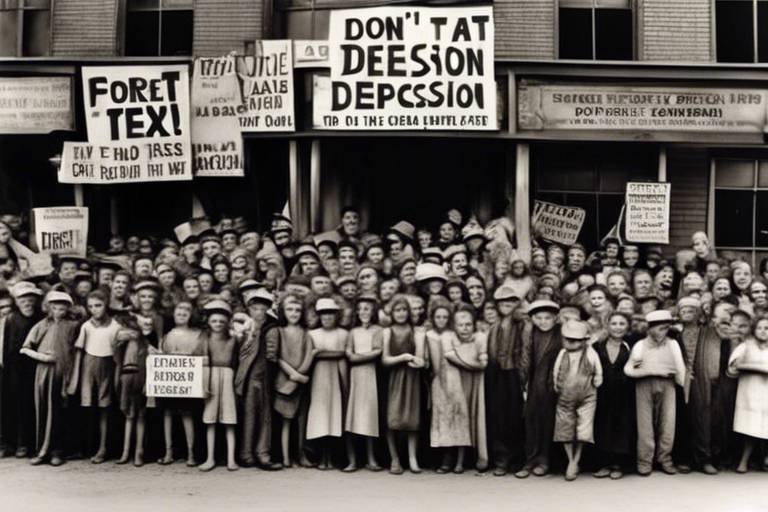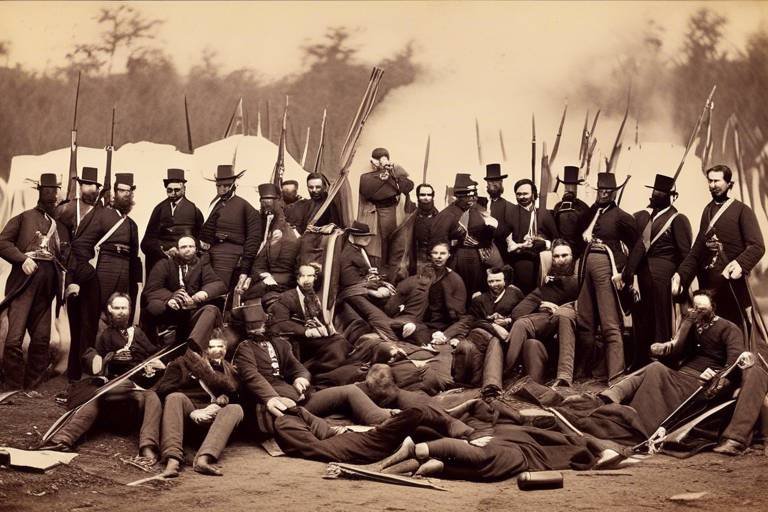The Great Depression - Causes and Effects on Society
The Great Depression was a period of immense hardship and suffering that left a lasting impact on society. The causes and effects of this economic crisis reverberated through every aspect of people's lives, from their financial stability to their mental well-being. As the stock market crashed and industries collapsed, the economic foundations crumbled, sending shockwaves through communities and families.
Unemployment soared to unprecedented levels during the Great Depression, plunging countless individuals into poverty and homelessness. The once stable jobs disappeared overnight, leaving families struggling to make ends meet and facing a stark decline in their living standards. The widespread job losses created a ripple effect that touched every corner of society, reshaping the social fabric in profound ways.
Amid the economic turmoil, the social impact of the Great Depression was profound. Families were torn apart, communities fractured, and social structures strained to their limits. Daily life became a battleground of survival, with mental health challenges on the rise as people grappled with the uncertainty and despair that engulfed them. The once vibrant society was now a shadow of its former self, struggling to find its footing in a world turned upside down.
As the crisis deepened, governments scrambled to respond to the escalating challenges. Relief programs were rolled out, public works projects initiated, and financial regulations put in place to stem the tide of devastation. The role of government in society underwent a significant transformation, as leaders sought to navigate the uncharted waters of a global economic collapse.
The impact of the Great Depression was not confined within national borders; it had far-reaching global consequences. Economies worldwide felt the shockwaves of the crisis, leading to political instability and social unrest in various countries. The interconnected nature of the world became painfully apparent as nations grappled with the fallout of a crisis that knew no boundaries.
Amidst the chaos, cultural changes swept through society, reshaping the artistic and intellectual landscape. Art, literature, and music reflected the tumultuous times, giving voice to the struggles and resilience of the human spirit. New social movements emerged, challenging the status quo and advocating for change in a world reeling from the aftershocks of an economic earthquake.
The legacy of the Great Depression endures to this day, shaping the way we approach economic and social policies. The lessons learned from this dark chapter in history continue to inform our decisions, reminding us of the fragility of prosperity and the resilience of the human spirit in the face of adversity. The scars of the past serve as a poignant reminder of the need for vigilance and compassion in building a more just and equitable society.

Economic Factors
The Great Depression was a monumental event in history that had far-reaching consequences on society. One of the key factors that contributed to the onset of the Great Depression was the stock market crash of 1929. This event sent shockwaves through the economy, leading to a domino effect of financial instability. As stock prices plummeted, investors lost massive amounts of wealth, causing a ripple effect that reverberated throughout the entire economic landscape.
Another significant economic factor that played a role in the Great Depression was the widespread failure of banks. As individuals and businesses lost confidence in the banking system, they rushed to withdraw their savings, leading to a wave of bank closures. The collapse of the banking sector further exacerbated the economic crisis, as access to credit dried up, businesses struggled to stay afloat, and consumers faced financial uncertainty.
Furthermore, the collapse of industries during the Great Depression added fuel to the fire, deepening the economic turmoil. As demand for goods and services plummeted, businesses were forced to lay off workers or shut down entirely. This mass unemployment only served to worsen the economic downturn, creating a cycle of hardship for individuals and families across the nation.
In summary, the economic factors that contributed to the Great Depression, including the stock market crash, bank failures, and industrial collapse, created a perfect storm of financial devastation that had lasting effects on society. The repercussions of these events were felt for years to come, shaping government policies, social structures, and cultural norms in profound ways.

Unemployment Crisis
The Unemployment Crisis during the Great Depression was a devastating aspect that shook the very foundation of society. As millions of individuals found themselves out of work, the ripple effects were felt far and wide, plunging families into poverty and uncertainty.
With industries collapsing and businesses shutting down, the job market dried up rapidly, leaving countless individuals without a source of income. The soaring unemployment rates led to a sharp increase in homelessness, as families struggled to make ends meet and many were forced to live in shantytowns known as "Hoovervilles."
Moreover, the Unemployment Crisis not only brought financial hardship but also took a toll on the mental health of those affected. The sense of despair and hopelessness that accompanied prolonged joblessness had profound psychological effects, leading to a rise in mental health challenges across communities.
As the unemployment crisis deepened, social structures strained under the pressure, with families breaking apart due to the inability to provide for basic needs. The lack of stable employment opportunities not only impacted individuals but also reshaped the fabric of communities, creating a sense of instability and unrest.
Government efforts to address the Unemployment Crisis were crucial during this tumultuous period. Relief programs such as the Works Progress Administration (WPA) provided jobs for millions of unemployed Americans, helping to alleviate some of the economic hardships faced by the population.
In conclusion, the Unemployment Crisis of the Great Depression was a harrowing experience that left a lasting impact on society. It serves as a stark reminder of the importance of robust social safety nets and proactive measures to prevent such widespread job losses in the future.

Social Impact
During the Great Depression, the social impact was profound and far-reaching, touching the lives of individuals and communities in various ways. Families faced immense challenges as unemployment soared and incomes dwindled, leading to widespread poverty and hardships. The stability of households was shaken, with many struggling to put food on the table and keep a roof over their heads. The sense of security and normalcy that people once knew was replaced by uncertainty and fear, as the economic downturn took its toll on daily life.
Communities grappled with the fallout of the economic crisis, witnessing a surge in social unrest and discontent. The fabric of society strained under the weight of widespread joblessness and financial strain, as tensions simmered and frustrations mounted. The once-thriving neighborhoods and bustling main streets now bore the scars of economic hardship, with empty storefronts and lines of people seeking assistance painting a stark picture of the era.
Moreover, the Great Depression brought to light the mental health challenges faced by many individuals during this tumultuous time. The psychological toll of enduring financial insecurity, constant worry about the future, and the loss of dignity associated with poverty left lasting scars on the mental well-being of many. Depression, anxiety, and a sense of hopelessness became prevalent, further exacerbating the social impact of the crisis.

Government Response
During the Great Depression, governments worldwide faced the monumental task of responding to the economic crisis and societal upheaval that gripped their nations. In the United States, President Franklin D. Roosevelt implemented the New Deal, a series of programs aimed at providing relief, recovery, and reform. One of the key components of the New Deal was the establishment of agencies such as the Works Progress Administration (WPA) and the Civilian Conservation Corps (CCC), which aimed to create jobs and stimulate the economy through public works projects.
Additionally, financial regulations were put in place to prevent another stock market crash and banking collapse. The Glass-Steagall Act, for example, separated commercial banking from investment banking to reduce the risk of another financial crisis. Social Security was also introduced to provide a safety net for the elderly and unemployed, marking a significant shift in government welfare policies.
Internationally, governments implemented various strategies to combat the effects of the Great Depression. In Germany, Adolf Hitler rose to power on promises of economic recovery and national pride, leading to the expansion of the Nazi regime. In the Soviet Union, Joseph Stalin's policies focused on rapid industrialization and collectivization, transforming the country's economy but also resulting in widespread hardship.
The government response to the Great Depression was multifaceted and varied across countries, reflecting the diverse approaches taken to address the unprecedented challenges posed by the economic downturn. While some programs were successful in providing relief and stabilizing economies, others had long-lasting consequences that shaped the course of history.

Global Influence
The Great Depression had a profound global influence, extending far beyond the borders of the United States where it originated. The economic shockwaves of the 1930s reverberated across the world, triggering widespread hardship and reshaping the geopolitical landscape. Countries worldwide experienced a domino effect of financial collapse, trade disruption, and mass unemployment, leading to a synchronized downturn in the global economy.
As the crisis deepened, nations scrambled to protect their own interests, resorting to protectionist measures that further exacerbated the situation. International trade plummeted, tariffs soared, and once-thriving industries faced decimation. The interconnectedness of economies became strikingly apparent as the effects of the Great Depression rippled through continents, eroding prosperity and stability on a monumental scale.
Moreover, the global influence of the Great Depression extended beyond economics, permeating the social and political fabric of societies worldwide. In many countries, the turmoil fueled social unrest, political extremism, and the rise of authoritarian regimes. Desperation and disillusionment gripped populations, leading to widespread protests, strikes, and uprisings against governments ill-equipped to address the crisis.
The Great Depression's global influence also left a lasting imprint on international relations, reshaping the balance of power and paving the way for significant geopolitical shifts. The breakdown of the old world order gave rise to new alliances, ideologies, and conflicts, setting the stage for the tumultuous events that would unfold in the decades to come.

Cultural Changes
The Great Depression brought about significant cultural changes that reverberated through society. During this tumultuous period, art, literature, music, and social movements underwent transformations that reflected the struggles and resilience of the era. Artists and writers captured the despair and hope of the time, creating works that resonated with the public's experiences. The cultural landscape shifted as new forms of expression emerged, offering solace and inspiration amidst the chaos.
One notable cultural change was the rise of social realism in art and literature, which depicted the harsh realities of life during the Great Depression. Artists like Dorothea Lange and writers such as John Steinbeck portrayed the struggles of ordinary people, shedding light on issues of poverty, inequality, and social injustice. Their works not only documented the hardships of the era but also sparked conversations and raised awareness about the need for social change.
Music also played a crucial role in reflecting the mood of the Great Depression. The era saw the emergence of protest songs and folk music that spoke to the experiences of the working class. Artists like Woody Guthrie and Lead Belly used their music to voice the concerns of the downtrodden and marginalized, fostering a sense of unity and solidarity among those facing adversity.
Furthermore, the Great Depression witnessed the birth of new social movements that sought to address the economic and social challenges of the time. Organizations like the Works Progress Administration (WPA) supported artists and writers, encouraging the creation of public art and literature that reflected the spirit of resilience and community. These initiatives not only provided employment opportunities for creatives but also enriched the cultural fabric of society.
In conclusion, the cultural changes spurred by the Great Depression left a lasting impact on society, shaping artistic expression, social consciousness, and collective identity. The era's artistic legacy continues to resonate today, serving as a reminder of the power of creativity and resilience in the face of adversity.

Legacy and Lessons Learned
The Great Depression left a profound legacy that continues to shape economic and social policies to this day. The lessons learned from this tumultuous period in history serve as a cautionary tale, reminding us of the devastating consequences of unchecked economic instability.
One of the key legacies of the Great Depression is the importance of government intervention during times of crisis. The failure of laissez-faire economic policies to prevent or mitigate the effects of the Depression led to a fundamental shift in the role of government in regulating the economy. The New Deal programs implemented by President Franklin D. Roosevelt in response to the crisis laid the foundation for the modern welfare state and established the government's responsibility to provide social safety nets for its citizens.
Moreover, the Great Depression highlighted the interconnectedness of global economies and the need for international cooperation to address economic challenges. The protectionist policies adopted by many countries in response to the economic downturn exacerbated the crisis, leading to a deeper and more prolonged recession. This experience underscored the importance of open trade and collaboration between nations to foster economic growth and stability.
Additionally, the social impact of the Great Depression underscored the importance of addressing inequality and poverty to prevent social unrest and promote a more equitable society. The stark disparities in wealth and opportunity exposed during the Depression prompted a reevaluation of social policies and a renewed focus on creating a more inclusive economy that benefits all members of society.
Furthermore, the cultural changes that emerged during the Great Depression, such as the rise of social realism in art and literature, reflected a growing awareness of social issues and a desire for change. The voices of marginalized communities became more prominent, leading to a greater emphasis on social justice and equality in cultural expression.
In conclusion, the legacy of the Great Depression serves as a reminder of the importance of proactive government intervention, international cooperation, social equity, and cultural expression in shaping a more resilient and inclusive society. By learning from the mistakes and challenges of the past, we can build a more sustainable future for generations to come.
Frequently Asked Questions
- What caused the Great Depression?
The Great Depression was primarily caused by a combination of economic factors, including the stock market crash of 1929, bank failures, and the collapse of industries. These events led to a severe downturn in the global economy, triggering widespread unemployment and financial hardship.
- How did the Great Depression impact society?
The Great Depression had far-reaching effects on society, resulting in high levels of unemployment, poverty, and social unrest. Families struggled to make ends meet, communities faced economic challenges, and individuals experienced mental health issues due to the prolonged economic downturn.
- What were some of the government responses to the Great Depression?
In response to the Great Depression, governments implemented various relief programs, public works projects, and financial regulations to stimulate the economy and provide assistance to those in need. These initiatives aimed to create jobs, support struggling industries, and stabilize the financial system.
- How did the Great Depression influence global economies?
The Great Depression had a significant impact on global economies, causing widespread economic turmoil and contributing to political instability in many countries. The interconnected nature of the global economy meant that the effects of the Great Depression were felt worldwide, leading to a period of international economic hardship.
- What cultural changes occurred during the Great Depression?
The Great Depression brought about cultural shifts in various forms of art, literature, music, and social movements. Artists and writers reflected the hardships of the era in their work, and new social movements emerged to address the economic and social challenges faced by individuals and communities.
- What lessons have been learned from the Great Depression?
The Great Depression taught valuable lessons about the importance of financial regulation, social safety nets, and government intervention in times of economic crisis. Policymakers have since implemented measures to prevent a similar economic catastrophe and to support individuals and industries during periods of downturn.



















